Sep 12, 2022 | Non categorizzato
Just as she loved and cared for her son Jesus, Mary wants the good of every person. She, a human being, is the model for every Christian, and by mirroring the stages of her life we can make our contribution to a new world. Even though our planet is beset with many tensions, Mary leads us in various ways to unity, and she desires this for all. She wants families united, different generations united; she asks for unity among different ethnic groups, races, and peoples; unity among Christians and unity, as far as it is possible, with the faithful of other religions and even with those who have no specific religious affiliation but seek the welfare of humankind. She reaches out to everyone, and she desires universal brotherhood. (…) May Mary, who made God the ideal of her life, help us make him our ideal as well. May Mary, who embraced the will of God in the incarnation and in her whole life, help us to fulfill his will to perfection. May she, who loved her neighbor as demonstrated in her visit to Elizabeth and at the wedding at Cana, fill our hearts with this same love. May Mary, who lived mutual love fully in the family at Nazareth, help us to practice it as well. May Mary, who was able to offer all her suffering at the foot of the cross, strengthen our hearts when we are besieged by suffering. May Mary, who is the universal mother, open our hearts to all humankind.
Chiara Lubich
(Chiara Lubich, Talk given in the Basilica di Santa Maria Maggiore, Rome, 30-11-1987, in Mary, The Transparency of God, New City Press, New York, 2003, p 81-82)
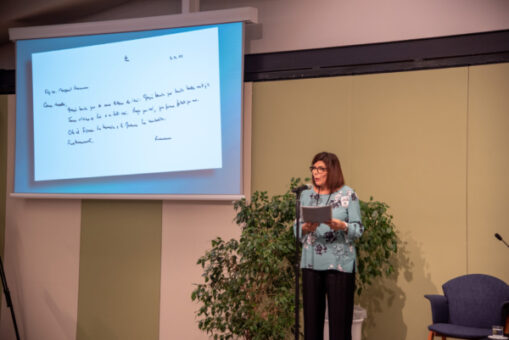
Sep 10, 2022 | Non categorizzato
In addition to the joy of being together again in person after the pandemic, an unexpected and affectionate greeting from Pope Francis has arrived to those with overall responsibility for the Focolare Movement around the world, who are meeting from 10th to 23rd September.  “I am grateful for so much good news. I am close to you personally, and to all of you. I assure you of my prayers, please pray for me too.” These were the Pope’s words in reply to a letter from Margaret Karram, President of the Focolare Movement, with which she chose to open the meeting of those responsible for the Focolare Movement in the world, together with its General Council. The President told the 104 people at the meeting that a few days ago she had felt urged to write to the Pope, to thank him for his constant closeness to her and to the Movement, hoping to give him joy. In her letter dated 6th September, among other things, she told the Pope: ‘A year and seven months have passed since I was elected President, and I confide in you that it has been a very demanding time with many challenges to be faced and many decisions to be made. I have understood more and more your words referring to the ‘pruning’ which is necessary for growth and, as I renewed my choice to embrace Jesus crucified and forsaken in this pruning, I perceived that I became more humble, I felt greater hope, and that my unity with you, Your Holiness, was ever stronger, together with the certainty that God is at work. At the same time, I witnessed a great fruitfulness and, in individuals and communities, I witnessed steps in spiritual growth being taken. I also saw greater care for the ‘least,’ and many tangible actions to help those who suffer the most’. Margaret concluded by assuring the Pope of the prayers of everyone in the Movement. She was very surprised when the following day she received this handwritten reply from Pope Francis:
“I am grateful for so much good news. I am close to you personally, and to all of you. I assure you of my prayers, please pray for me too.” These were the Pope’s words in reply to a letter from Margaret Karram, President of the Focolare Movement, with which she chose to open the meeting of those responsible for the Focolare Movement in the world, together with its General Council. The President told the 104 people at the meeting that a few days ago she had felt urged to write to the Pope, to thank him for his constant closeness to her and to the Movement, hoping to give him joy. In her letter dated 6th September, among other things, she told the Pope: ‘A year and seven months have passed since I was elected President, and I confide in you that it has been a very demanding time with many challenges to be faced and many decisions to be made. I have understood more and more your words referring to the ‘pruning’ which is necessary for growth and, as I renewed my choice to embrace Jesus crucified and forsaken in this pruning, I perceived that I became more humble, I felt greater hope, and that my unity with you, Your Holiness, was ever stronger, together with the certainty that God is at work. At the same time, I witnessed a great fruitfulness and, in individuals and communities, I witnessed steps in spiritual growth being taken. I also saw greater care for the ‘least,’ and many tangible actions to help those who suffer the most’. Margaret concluded by assuring the Pope of the prayers of everyone in the Movement. She was very surprised when the following day she received this handwritten reply from Pope Francis:
7.9.22
Ms Margaret Karram My dear sister, Thank you very much for your letter to me yesterday. I am grateful for so much good news. I am close to you personally, and to all of you. I assure you of my prayers, please pray for me too. May the Lord bless you and may Mary protect you. Fraternally, Francis 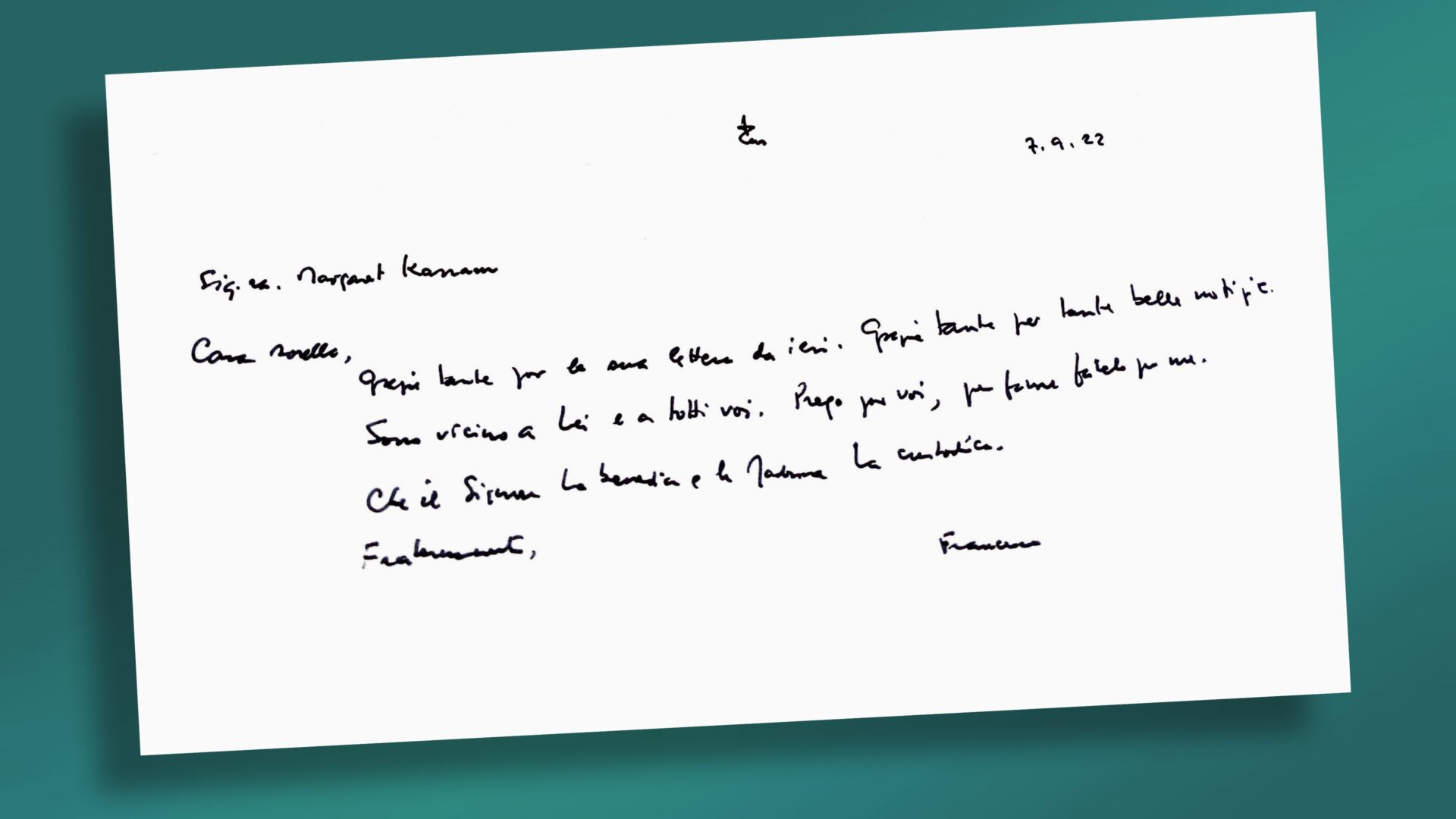
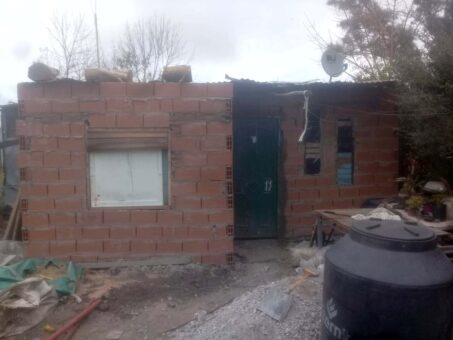
Sep 7, 2022 | Senza categoria
“Giving’ is like a breeze that opens so many doors. Here is the story of some Youth for Unity who supported a family in need on the outskirts of Buenos Aires, Argentina.The friendship that developed led to them sharing in experiences they could never have imagined. The work begun a few months ago by Youth for Unity, together with New Youth and other members of the community, in the cities of Rodríguez and Luján in the province of Buenos Aires, has developed in an unexpected and providential way. It all started at Christmas 2021, when some Youth for Unity thought of the fact that some families would not have anything special to eat during the festive season and they decided to take concrete action. . The first thing they did was was to contact Titian and his parents. Titan was five years old and lived with his family in difficult circumstances in a very poor area. They prepared a beautiful hamper for them, full of delicious things they could eat at such a special time: these included a chicken, a salad, good wine, cider, panettone, pudding and some fizzy drinks. They also thought of some presents. But the joy they created did not end there. When the Youth for Unity took the Christmas hamper to the family, they began to understand first-hand the reality in which these people were living. Having decent housing, even if only to avoid being left in the cold during the winter, seemed utopian. “It was shocking,” one representative from New Youth said, “but, at the same time, it was also a moment of real joy. In addition, chatting with Titian’s parents, the child’s enthusiasm to start the first year of primary school emerged and our concrete response was unanimous: ‘let’s support him!’” “We decided to buy him everything he needed for school. This meant shoes, socks, t-shirts, trousers, apron, backpack, exercise book, pencils,” say the Youth for Unity, who also received financial help from other young people, friends from Mendoza in Argentina and Guatemala. They still remember Titian’s first day at school: “Mum sent us photos of the child with his new things, they were really very happy.” 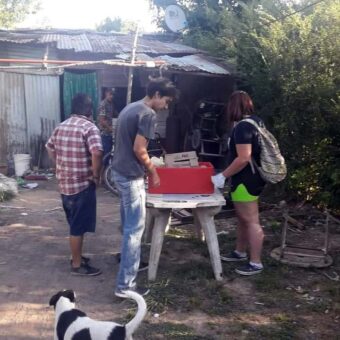
 But there is more. Some time later, volunteers and other adults who knew the Movement – many of them housewives linked to New Humanity – told them that they had providentially obtained money to buy materials to build a house for the family. Ricardo, the father, was an accomplished builder and also had some sand and building materials. In this way, the financial help was transformed into bricks and cement and within 20 days, the house was standing. Winter was approaching and it was very important for them to have shelter. A voice message from Titian on WhatsApp confirmed this: ‘Thank you for donating the bricks for my room.’
But there is more. Some time later, volunteers and other adults who knew the Movement – many of them housewives linked to New Humanity – told them that they had providentially obtained money to buy materials to build a house for the family. Ricardo, the father, was an accomplished builder and also had some sand and building materials. In this way, the financial help was transformed into bricks and cement and within 20 days, the house was standing. Winter was approaching and it was very important for them to have shelter. A voice message from Titian on WhatsApp confirmed this: ‘Thank you for donating the bricks for my room.’
(from Ciudad Nueva magazine, Cono Sud)
Sep 5, 2022 | Non categorizzato
On 2 June 2000, the first conference on ‘Communication and Unity’ was held, in which Chiara Lubich presented to those attending, the model of the ‘great communicator’: Jesus in the moment of his forsakenness, the mediator between humanity and God. She then listed the guiding principles of communications inspired by the charism of unity. It is unthinkable that a new communication be imposed from above, by some international agency or institution. It will come rather from the experience of communicators who have God-Love as a model for communication and as a paradigm for professional relations. Guiding principles of our communication—And indeed it is God-Love that those of us who are involved in communication seek to draw upon. They have developed out of their daily experience an original way of communicating. We present it here as a small contribution to the body of research being developed today. The first thought: for them communication is essential. The effort to live the gospel in everyday life, the experience of the Word of Life, has always been indissolubly united with communicating it, describing the various steps and the results, since it is a law that we love others as ourselves. They believe that what is not communicated is lost. So life generates light, both for those who speak and for those who listen, and it seems the experience is fixed in eternity. They have almost a vocation for communication. The second thought: to communicate, we feel the need “to make ourselves one” as we say, with the one who is listening A third thought: emphasize the positive. It has always been our way to put what is good into light, out of a conviction that it is infinitely more constructive to point out what is good, dwelling on the good and positive aspects, than to stop at the negative, even though whoever is in a position of responsibility has the duty at the proper moment to point out errors, shortcomings and failures. Finally: the person matters, not the media, which are merely an instrument. Bringing about unity first of all requires the indispensable means, which is the person, St. Paul’s new self, who has welcomed the mandate of Christ to be leaven, salt, light of the world.
Chiara Lubich
(Chiara Lubich, Essential Writings, New City Press, New York, and New City London 2007 p. 295-296)
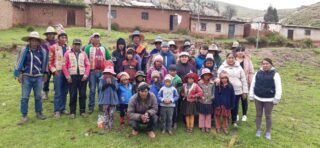
Sep 1, 2022 | Non categorizzato
As part of the programme of activities for United World Week 2022, the preparation team from Cochabamba (Bolivia), in coordination with the ‘Casa de los Niños’ in the same city, organised a visit to the rural community of Carpani 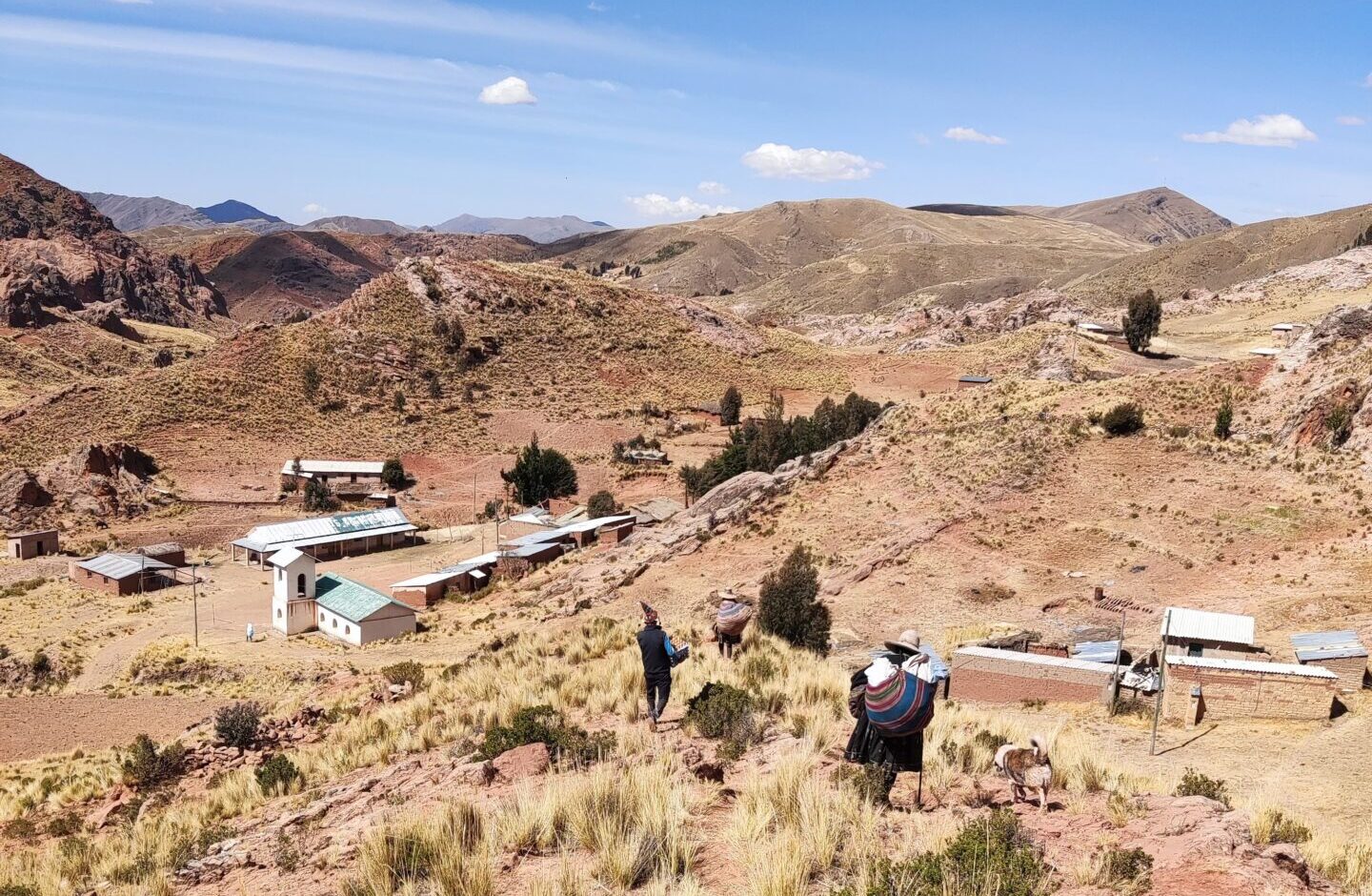 Carpani is a small town of 250 inhabitants, located in the Bolivian highlands (3,900 metres above sea level), between the departments of Cochabamba and Oruro. The invitation to visit the village was addressed to young people in particular but also to anyone else who was interested in joining. To get to the small town of Carpani (135 km from Cochabamba), we travelled for three hours on a mostly tarmaced road along an uphill mountain path. We then continued on a dirt track for about 15 km, and finally we followed a minor diversion, on a small road, to reach the village of brick and adobe clay houses nestled in the mountains. “The preparatory phase of the trip involved getting various goods, such as food and school materials for the small school which has just one multi-grade class,” says Aristide, head of the ‘Casa de los Niños’ (www.lacasadelosninos.it). Unfortunately, it has been neglected by local and national authorities who even withdrew the teacher’s salary but it has been receiving support from the ‘Casa de los Niños’ for many years – which also takes its inspiration from the charism of Unity – which tries to meet some of the many needs of the small population, sustained by a meagre production of potatoes and by grazing its small flocks of sheep.” Thanks to the support of the Focolare Movement community in Cochabamba, it has been possible to meet a large part of the needs that the Carpani community leader had told them about in advance.
Carpani is a small town of 250 inhabitants, located in the Bolivian highlands (3,900 metres above sea level), between the departments of Cochabamba and Oruro. The invitation to visit the village was addressed to young people in particular but also to anyone else who was interested in joining. To get to the small town of Carpani (135 km from Cochabamba), we travelled for three hours on a mostly tarmaced road along an uphill mountain path. We then continued on a dirt track for about 15 km, and finally we followed a minor diversion, on a small road, to reach the village of brick and adobe clay houses nestled in the mountains. “The preparatory phase of the trip involved getting various goods, such as food and school materials for the small school which has just one multi-grade class,” says Aristide, head of the ‘Casa de los Niños’ (www.lacasadelosninos.it). Unfortunately, it has been neglected by local and national authorities who even withdrew the teacher’s salary but it has been receiving support from the ‘Casa de los Niños’ for many years – which also takes its inspiration from the charism of Unity – which tries to meet some of the many needs of the small population, sustained by a meagre production of potatoes and by grazing its small flocks of sheep.” Thanks to the support of the Focolare Movement community in Cochabamba, it has been possible to meet a large part of the needs that the Carpani community leader had told them about in advance. 
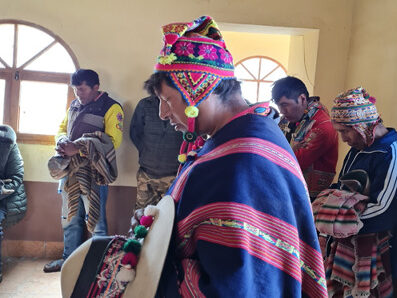 “The programme prepared for the day of the visit,” continued Silvana Verdún, “was very simple: community prayer in the small chapel, in the region’s native language of Quechua, although everyone also understands and speaks Spanish, followed by a moment of dialogue with the villagers, divided into groups of men, women and children.” “It was an experience of great mutual giving, and we all felt like brothers and sisters listening to each other and supporting each other, in the same simplicity and human warmth that characterises these people, as pure of heart as the sky and as untouched as the mountains that surround them,” said Franc Moura.
“The programme prepared for the day of the visit,” continued Silvana Verdún, “was very simple: community prayer in the small chapel, in the region’s native language of Quechua, although everyone also understands and speaks Spanish, followed by a moment of dialogue with the villagers, divided into groups of men, women and children.” “It was an experience of great mutual giving, and we all felt like brothers and sisters listening to each other and supporting each other, in the same simplicity and human warmth that characterises these people, as pure of heart as the sky and as untouched as the mountains that surround them,” said Franc Moura.  The finishing touch to the community meeting was unmissable – the moment for sharing an outdoor lunch. We prepared a communal table with all the dishes that each participant had brought, and they offered us the fruit of their labour: “potatoes a la wathia”. This is a cooking technique typically found in rural communities, which consists of digging a hole in the ground, the depth of which depends on the amount of food to be cooked; the cavity and the boulders extracted are heated with embers of firewood and charcoal. Once the right temperature is reached, the food is placed inside the hole and covered by the hot clods for a certain amount of time. These were beautiful moments that are etched in our hearts. A family from Cochabamba, on their first trip to Carpani, wrote: “We had an unforgettable experience as a family. When we returned home we sat down to talk about it and the conclusion we drew was one of absolute happiness. We were very happy to meet all of you volunteers and the community of Carpani. It was a real blessing and we would like to continue participating in other activities. Thank you for the opportunity”. The ‘united world’ also advances in little Carpani!
The finishing touch to the community meeting was unmissable – the moment for sharing an outdoor lunch. We prepared a communal table with all the dishes that each participant had brought, and they offered us the fruit of their labour: “potatoes a la wathia”. This is a cooking technique typically found in rural communities, which consists of digging a hole in the ground, the depth of which depends on the amount of food to be cooked; the cavity and the boulders extracted are heated with embers of firewood and charcoal. Once the right temperature is reached, the food is placed inside the hole and covered by the hot clods for a certain amount of time. These were beautiful moments that are etched in our hearts. A family from Cochabamba, on their first trip to Carpani, wrote: “We had an unforgettable experience as a family. When we returned home we sat down to talk about it and the conclusion we drew was one of absolute happiness. We were very happy to meet all of you volunteers and the community of Carpani. It was a real blessing and we would like to continue participating in other activities. Thank you for the opportunity”. The ‘united world’ also advances in little Carpani!
By Orlando José Zurita Vilte – Bolivia (from Ciudad Nueva Interamericana) Foto: © Franc Moura
Aug 29, 2022 | Non categorizzato
“In his first ‘Angelus’ message in Rome on 17th March 2013, Pope Francis said: “We don’t hear Jesus speaking words of contempt, or condemnation, but only words of love and mercy.” In fact, mercy and forgiveness are characteristic Christian virtues that we can practice every day with all the brothers and sisters we meet. What makes mercy so powerful that it triumphs over justice (cf. Lk. 1:54)? And why does Jesus consider this virtue so important that he makes it a condition for personal salvation? As Pope John Paul II clearly explained, mercy is “an indispensable dimension of love; it is, as it were, love’s second name.”[1] … This theme is found again in the prayer of the Our Father: “Forgive us our trespasses as we forgive those who trespass against us.” We could say that there is a law written in heaven in which our sins our remitted to the extent that we forgive our brothers and sisters. The theme of mercy and forgiveness pervades the entire Gospel. Actually, Jesus’ goal is what he revealed to us in his final prayer the night before his passion: to unite all people, to make all humanity one big family whose model is the Trinity. The whole of his teaching tends to give us, through his love, the tool for achieving this exceptional fellowship among ourselves and with God. And mercy is the utmost expression of love, of charity, that which completes it, which makes it perfect. Let’s try, then, in all our relationships, to live this love for others in the form of mercy! Mercy is a love that welcomes every neighbour, especially the poor and needy. It is a boundless, abundant, universal, and concrete love. It is a love which encourages reciprocity, which is the ultimate goal of mercy, without which there would be only justice, which serves to create equality, but not fraternity. People often talk about denying forgiveness to those who have committed serious crimes; revenge is called for more than justice. But once every attempt has been made to compensate for the damage done, we must make way for forgiveness, which is the only way to heal the personal and social trauma produced by wrongdoing. “Forgive and you will be forgiven” (Lk. 6:37). Therefore, if we have been offended or treated unjustly in any way, let’s forgive and we will be forgiven. Let’s be first to show kindness and compassion! Even if it seems difficult and requires great courage, let’s ask ourselves, in front of every neighbour: what would his or her mother do? This thought can help us to understand and live in accordance with the heart of God.
Chiara Lubich
(Chiara Lubich, in Parole di Vita, [Words of Life] Città Nuova, 2017, pp. 632/4) [1] John Paul II, Dives in Misericordia, n. 7
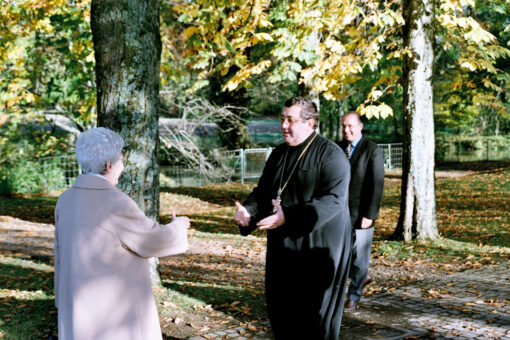
Aug 26, 2022 | Non categorizzato
The eleventh Assembly of the World Council of Churches runs from 31 August to 8 September 2022 in Karlsruhe, Germany. The Focolare Movement has long been linked to the WCC by ties of friendship and collaboration, which continue in this latest Assembly. In a world torn apart by conflicts, afflicted by a pandemic which has widened inequalities, overwhelmed by an unprecedented climate crisis, characterized by scientific and technological innovations which often create new disparities between people and regions of the world, does it make any sense to speak of unity? And, if so, what contribution can Christians make to achieve it? These fundamental questions will be at the heart of the 11th Assembly of the World Council of Churches, taking place at Karlsruhr, Germany from 31 August to 8 September 2022. The Assembly, the highest governing body of the World Council of Churches, is normally convened every eight years. 352 Churches now belong to the WCC, in 110 countries, representing around 500 million Christians. The Assembly will gather around 4,000 participants from all around the world.  Unity, for Christians, is the fulfilment of Jesus’ prayer “that they may all be one” (John 17:21). Words which inspire confidence in the Assembly’s title: “Christ’s love moves the world to reconciliation and unity”. The work of the Assembly springs from reflecting on the great challenges of the planet which have revealed such vulnerability, as well as ethnic, economic and social divisions and injustices. But which have also highlighted the interdependence of individuals and peoples; the responsibility we have towards others in a world in which no-one can save themselves on their own. In this context, the Christian Churches are gathering together for prayer and celebration, for reflection and action. It’s an opportunity to deepen their commitment to dialogue, visible unity and common testimony. Alongside the official delegates’ program are around 100 workshops and stands hosted by various Churches, Communities and Institutions, including the Focolare Movement sharing its own wide-ranging experience of dialogue. The Focolare stand will be supported throughout the Assembly by the team of “Centro Uno” (which coordinates the ecumenical activity of the Focolare internationally), with Focolare members from Germany, Switzerland, Ireland and Romania. On 5 September at 17:00, they will host a workshop on “Dialogue as a lifestyle: methodology and practice”, offering an experience of dialogue between Christians of different Churches, and between Christians and Muslims. A dialogue involving maximum respect of each one’s identity, prioritizing the engagement of theory with life. The World Council of Churches came into being on 23 August 1948, originally with 147 member Churches. Its principal aim to enable dialogue as the way and characteristic of authentic Christian life. The Focolare Movement’s links with the WCC go back to 1967 when Swiss Reformed theologian Lukas Vischer invited Chiara Lubich to Geneva. On her third visit, in 2002, Chiara also visited the WCC’s Ecumenical Institute at Bossey. WCC General Secretary Rev. Prof. Ioan Sauca has, on more than one occasion, referred to the importance to the Institute of that meeting with Chiara Lubich and her clarity in addressing the often challenging relationship between identity and unity.
Unity, for Christians, is the fulfilment of Jesus’ prayer “that they may all be one” (John 17:21). Words which inspire confidence in the Assembly’s title: “Christ’s love moves the world to reconciliation and unity”. The work of the Assembly springs from reflecting on the great challenges of the planet which have revealed such vulnerability, as well as ethnic, economic and social divisions and injustices. But which have also highlighted the interdependence of individuals and peoples; the responsibility we have towards others in a world in which no-one can save themselves on their own. In this context, the Christian Churches are gathering together for prayer and celebration, for reflection and action. It’s an opportunity to deepen their commitment to dialogue, visible unity and common testimony. Alongside the official delegates’ program are around 100 workshops and stands hosted by various Churches, Communities and Institutions, including the Focolare Movement sharing its own wide-ranging experience of dialogue. The Focolare stand will be supported throughout the Assembly by the team of “Centro Uno” (which coordinates the ecumenical activity of the Focolare internationally), with Focolare members from Germany, Switzerland, Ireland and Romania. On 5 September at 17:00, they will host a workshop on “Dialogue as a lifestyle: methodology and practice”, offering an experience of dialogue between Christians of different Churches, and between Christians and Muslims. A dialogue involving maximum respect of each one’s identity, prioritizing the engagement of theory with life. The World Council of Churches came into being on 23 August 1948, originally with 147 member Churches. Its principal aim to enable dialogue as the way and characteristic of authentic Christian life. The Focolare Movement’s links with the WCC go back to 1967 when Swiss Reformed theologian Lukas Vischer invited Chiara Lubich to Geneva. On her third visit, in 2002, Chiara also visited the WCC’s Ecumenical Institute at Bossey. WCC General Secretary Rev. Prof. Ioan Sauca has, on more than one occasion, referred to the importance to the Institute of that meeting with Chiara Lubich and her clarity in addressing the often challenging relationship between identity and unity.
Anna Lisa Innocenti
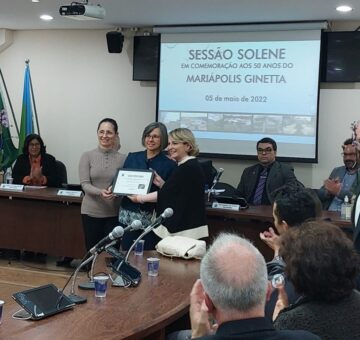
Aug 25, 2022 | Focolare Worldwide
Mariapolis Ginetta celebrated its golden jubilee on August 15. The dream of its pioneers is now reality: it is a beacon of unity, dialogue and a new society for all. Since its genesis, the Catholic Church has sought in various ways to live out Jesus’ mandate in his priestly prayer, “Father, may they be one, as we are one” (Jn 17–21). Unity and dialogue are, even today, the basis of many ecclesial activities and thought. It was during World War II, in the city of Trent, Italy, that 21-year-old Chiara Lubich realized she wanted to live and spread unity among all peoples of the world, believers and non-believers alike. In Brazil, through Mariapolis Ginetta, this mission has been fruitful for 50 years now. City on the hill 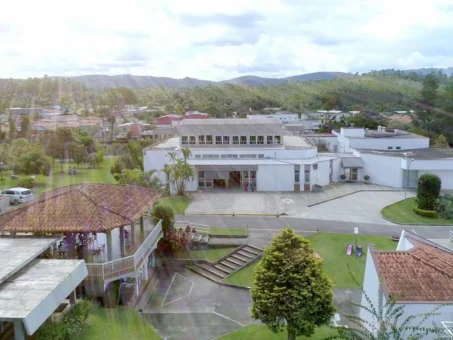 In founding the Focolare Movement, and taking a cue from her own experiences, Chiara thought it would be good to give rise to cities placed on the hill – visible and luminous, true beacons for society, where people could live the Gospel, in communion and mutual love, and experiencing the constant presence of God. Around the world today, there are 35 permanent Mariapolises, little towns started by the Focolare. Three in Brazil: Mariapolis Santa Maria near Recife, Mariapolis Gloria near Belem, and Mariapolis Ginetta, in the state of São Paulo at Vargem Grande Paulista, which on the Feast of the Assumption, August 15, celebrated its golden jubilee. Mariapolis Ginetta Fruit of God’s providence, and witness to much activity, the Mariapolis has been a place of spiritual and social gatherings for thousands of people all over the world. Inhabited by families, consecrated lay people, priests, and people of other religious denominations, this flagship little city is a space where each visitor can experience God. Karina Gonçalves Sobral, who lives with her husband and two daughters in the community, stresses the importance of the spirituality of unity and the values contained in the local culture. “The Mariapolis has as its mission to be a gathering place, an open house open for everyone. And it is truly for everyone. Those who come here feel welcomed. It is part of our charism, welcoming.” “Looking at various pieces of land that were proposed 50 years ago, this one in Vargem Grande really seemed to have the right characteristics to be a fruitful space where we could visibly embody the ideal of unity,” says Maria do Socorro Pimentel, a focolarina who has lived in the little city for more than 40 years. “We settled here, and today we celebrate an important milestone.” The founder’s presence
In founding the Focolare Movement, and taking a cue from her own experiences, Chiara thought it would be good to give rise to cities placed on the hill – visible and luminous, true beacons for society, where people could live the Gospel, in communion and mutual love, and experiencing the constant presence of God. Around the world today, there are 35 permanent Mariapolises, little towns started by the Focolare. Three in Brazil: Mariapolis Santa Maria near Recife, Mariapolis Gloria near Belem, and Mariapolis Ginetta, in the state of São Paulo at Vargem Grande Paulista, which on the Feast of the Assumption, August 15, celebrated its golden jubilee. Mariapolis Ginetta Fruit of God’s providence, and witness to much activity, the Mariapolis has been a place of spiritual and social gatherings for thousands of people all over the world. Inhabited by families, consecrated lay people, priests, and people of other religious denominations, this flagship little city is a space where each visitor can experience God. Karina Gonçalves Sobral, who lives with her husband and two daughters in the community, stresses the importance of the spirituality of unity and the values contained in the local culture. “The Mariapolis has as its mission to be a gathering place, an open house open for everyone. And it is truly for everyone. Those who come here feel welcomed. It is part of our charism, welcoming.” “Looking at various pieces of land that were proposed 50 years ago, this one in Vargem Grande really seemed to have the right characteristics to be a fruitful space where we could visibly embody the ideal of unity,” says Maria do Socorro Pimentel, a focolarina who has lived in the little city for more than 40 years. “We settled here, and today we celebrate an important milestone.” The founder’s presence 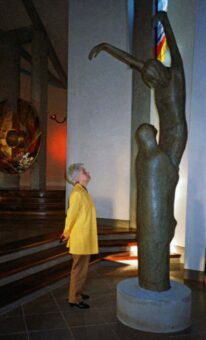
 Chiara Lubich visited the Mariapolis Ginetta several times, and it was on one of her trips, in 1991, when she came face to face with the great social inequality of the Brazilian population. She was particularly inspired, and it was here that she created the Economy of Communion, whose main goal is to develop a network of businesses that share their profits, contrasting the culture of having with the culture of giving. The Mariapolis is named after one of Chiara Lubich’s earliest friends, Servant of God Ginetta Calliari, one of the greatest supporters of building this “city on the hill” who started the Focolare Movement in Brazil. Her body is buried in the cemetery there, where many faithful go to ask for graces. Recognition Starting in May 2022, the city of Vargem Grande Paulista recognized the social and spiritual work carried out by the Focolare Movement there and the importance not only of Mariapolis Ginetta, but all the work that supports children, adolescents and young people. Not to be forgotten is the work of establishing shelters for the homeless and a communication system, which has attracted investment, partnerships and lifted the profile of the municipality. For the mass celebrated on August 15, by Don João Bosco, Bishop of Osasco, Pope Francis sent an apostolic blessing, written in gratitude for this mission carried out by the Focolare Movement in the city, the state of São Paulo and throughout Brazil.
Chiara Lubich visited the Mariapolis Ginetta several times, and it was on one of her trips, in 1991, when she came face to face with the great social inequality of the Brazilian population. She was particularly inspired, and it was here that she created the Economy of Communion, whose main goal is to develop a network of businesses that share their profits, contrasting the culture of having with the culture of giving. The Mariapolis is named after one of Chiara Lubich’s earliest friends, Servant of God Ginetta Calliari, one of the greatest supporters of building this “city on the hill” who started the Focolare Movement in Brazil. Her body is buried in the cemetery there, where many faithful go to ask for graces. Recognition Starting in May 2022, the city of Vargem Grande Paulista recognized the social and spiritual work carried out by the Focolare Movement there and the importance not only of Mariapolis Ginetta, but all the work that supports children, adolescents and young people. Not to be forgotten is the work of establishing shelters for the homeless and a communication system, which has attracted investment, partnerships and lifted the profile of the municipality. For the mass celebrated on August 15, by Don João Bosco, Bishop of Osasco, Pope Francis sent an apostolic blessing, written in gratitude for this mission carried out by the Focolare Movement in the city, the state of São Paulo and throughout Brazil.
Ronnaldh Oliveira (From cancaonova.com)
Aug 22, 2022 | Non categorizzato
Professor Giuseppe Argiolas has offered his resignation as Rector of the Sophia University Institute “for personal reasons”. The present Vice Rector, Professor Declan O’Byrne has been appointed as Acting Rector and will serve in this capacity until the natural end of the mandate, January 2024. The Vice Chancellor, Margaret Karram, President of the Focolare Movement, has written to the academic community of the Institute saying: “I ask you all to collaborate fully with Professor Declan O’Byrne, who has accepted the role assigned to him by the Congregation for Catholic Education, so that the Sophia University Institute can continue its service of teaching, research and cultural engagement with due professional diligence. I am grateful to Professor Argiolas for his commitment and for the work he has done to develop Sophia, especially during these difficult times of the pandemic, 2020-2022. I entrust to the responsibility of the whole academic body the good outcome of this new academic year”. The teachers and staff at Sophia are united to the Vice Chancellor in thanking Professor Argiolas for his dedicated commitment at the service of the Institute.
Aug 22, 2022 | Non categorizzato
During the Fourth World Youth Day, held in Santiago de Compostela (Spain) in 1989, Chiara Lubich gave a talk entitled “Jesus is the way”. We have chosen an extract from it in which she invited everyone to set in motion the transforming power of love as Jesus himself did. He was God’s Son, he was love, and he came to earth out of love. He lived for love, spreading love, giving love, bringing the law of love and he died for love. Then he rose from the dead and ascended to heaven, fulfilling his plan of love. Everything was for love: love for you, love for me, love for everyone. We could say then that the way Jesus followed has a name: love. And we, who want to follow him, must walk along this way – the way of love. Love! Some of you might ask yourselves: what kind of love did Jesus have in his heart? Out of what kind of love did he act? What kind of love did he leave here on earth? The love that Jesus lived and brought on earth is a special and unique love. It is not the kind of love that you might imagine. It is not philanthropy; nor is it simply solidarity or kindness. It is not purely friendship or affection (like the love a boy can have for a girl, or a mother for her son); nor is it only non-violence. It is something exceptional, indeed, divine: it is the same ardent love that burns in God. Jesus has given us a flame of that infinite fire, a ray of that immense sun. It is something extraordinary. We do not think about this very often, but if we were to take it seriously, it would make us strong. … We must make this love become fruitful. How? By loving.
Chiara Lubich
(Chiara Lubich, L’amore al fratello, [Love of Neighbour] Città Nuova, 2012, pp. 50-51)






 Carpani is a small town of 250 inhabitants, located in the Bolivian highlands (3,900 metres above sea level), between the departments of Cochabamba and Oruro. The invitation to visit the village was addressed to young people in particular but also to anyone else who was interested in joining. To get to the small town of Carpani (135 km from Cochabamba), we travelled for three hours on a mostly tarmaced road along an uphill mountain path. We then continued on a dirt track for about 15 km, and finally we followed a minor diversion, on a small road, to reach the village of brick and adobe clay houses nestled in the mountains. “The preparatory phase of the trip involved getting various goods, such as food and school materials for the small school which has just one multi-grade class,” says Aristide, head of the ‘Casa de los Niños’ (www.lacasadelosninos.it). Unfortunately, it has been neglected by local and national authorities who even withdrew the teacher’s salary but it has been receiving support from the ‘Casa de los Niños’ for many years – which also takes its inspiration from the charism of Unity – which tries to meet some of the many needs of the small population, sustained by a meagre production of potatoes and by grazing its small flocks of sheep.” Thanks to the support of the Focolare Movement community in Cochabamba, it has been possible to meet a large part of the needs that the Carpani community leader had told them about in advance.
Carpani is a small town of 250 inhabitants, located in the Bolivian highlands (3,900 metres above sea level), between the departments of Cochabamba and Oruro. The invitation to visit the village was addressed to young people in particular but also to anyone else who was interested in joining. To get to the small town of Carpani (135 km from Cochabamba), we travelled for three hours on a mostly tarmaced road along an uphill mountain path. We then continued on a dirt track for about 15 km, and finally we followed a minor diversion, on a small road, to reach the village of brick and adobe clay houses nestled in the mountains. “The preparatory phase of the trip involved getting various goods, such as food and school materials for the small school which has just one multi-grade class,” says Aristide, head of the ‘Casa de los Niños’ (www.lacasadelosninos.it). Unfortunately, it has been neglected by local and national authorities who even withdrew the teacher’s salary but it has been receiving support from the ‘Casa de los Niños’ for many years – which also takes its inspiration from the charism of Unity – which tries to meet some of the many needs of the small population, sustained by a meagre production of potatoes and by grazing its small flocks of sheep.” Thanks to the support of the Focolare Movement community in Cochabamba, it has been possible to meet a large part of the needs that the Carpani community leader had told them about in advance. 
 “The programme prepared for the day of the visit,” continued Silvana Verdún, “was very simple: community prayer in the small chapel, in the region’s native language of Quechua, although everyone also understands and speaks Spanish, followed by a moment of dialogue with the villagers, divided into groups of men, women and children.” “It was an experience of great mutual giving, and we all felt like brothers and sisters listening to each other and supporting each other, in the same simplicity and human warmth that characterises these people, as pure of heart as the sky and as untouched as the mountains that surround them,” said Franc Moura.
“The programme prepared for the day of the visit,” continued Silvana Verdún, “was very simple: community prayer in the small chapel, in the region’s native language of Quechua, although everyone also understands and speaks Spanish, followed by a moment of dialogue with the villagers, divided into groups of men, women and children.” “It was an experience of great mutual giving, and we all felt like brothers and sisters listening to each other and supporting each other, in the same simplicity and human warmth that characterises these people, as pure of heart as the sky and as untouched as the mountains that surround them,” said Franc Moura. 

 In founding the Focolare Movement, and taking a cue from her own experiences, Chiara thought it would be good to give rise to cities placed on the hill – visible and luminous, true beacons for society, where people could live the Gospel, in communion and mutual love, and experiencing the constant presence of God. Around the world today, there are 35 permanent Mariapolises, little towns started by the Focolare. Three in Brazil: Mariapolis Santa Maria near Recife, Mariapolis Gloria near Belem, and Mariapolis Ginetta, in the state of São Paulo at Vargem Grande Paulista, which on the Feast of the Assumption, August 15, celebrated its golden jubilee. Mariapolis Ginetta Fruit of God’s providence, and witness to much activity, the Mariapolis has been a place of spiritual and social gatherings for thousands of people all over the world. Inhabited by families, consecrated lay people, priests, and people of other religious denominations, this flagship little city is a space where each visitor can experience God. Karina Gonçalves Sobral, who lives with her husband and two daughters in the community, stresses the importance of the spirituality of unity and the values contained in the local culture. “The Mariapolis has as its mission to be a gathering place, an open house open for everyone. And it is truly for everyone. Those who come here feel welcomed. It is part of our charism, welcoming.” “Looking at various pieces of land that were proposed 50 years ago, this one in Vargem Grande really seemed to have the right characteristics to be a fruitful space where we could visibly embody the ideal of unity,” says Maria do Socorro Pimentel, a focolarina who has lived in the little city for more than 40 years. “We settled here, and today we celebrate an important milestone.” The founder’s presence
In founding the Focolare Movement, and taking a cue from her own experiences, Chiara thought it would be good to give rise to cities placed on the hill – visible and luminous, true beacons for society, where people could live the Gospel, in communion and mutual love, and experiencing the constant presence of God. Around the world today, there are 35 permanent Mariapolises, little towns started by the Focolare. Three in Brazil: Mariapolis Santa Maria near Recife, Mariapolis Gloria near Belem, and Mariapolis Ginetta, in the state of São Paulo at Vargem Grande Paulista, which on the Feast of the Assumption, August 15, celebrated its golden jubilee. Mariapolis Ginetta Fruit of God’s providence, and witness to much activity, the Mariapolis has been a place of spiritual and social gatherings for thousands of people all over the world. Inhabited by families, consecrated lay people, priests, and people of other religious denominations, this flagship little city is a space where each visitor can experience God. Karina Gonçalves Sobral, who lives with her husband and two daughters in the community, stresses the importance of the spirituality of unity and the values contained in the local culture. “The Mariapolis has as its mission to be a gathering place, an open house open for everyone. And it is truly for everyone. Those who come here feel welcomed. It is part of our charism, welcoming.” “Looking at various pieces of land that were proposed 50 years ago, this one in Vargem Grande really seemed to have the right characteristics to be a fruitful space where we could visibly embody the ideal of unity,” says Maria do Socorro Pimentel, a focolarina who has lived in the little city for more than 40 years. “We settled here, and today we celebrate an important milestone.” The founder’s presence 